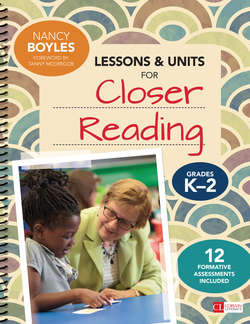Читать книгу Lessons and Units for Closer Reading, Grades K-2 - Nancy Boyles - Страница 31
На сайте Литреса книга снята с продажи.
Teaching and Assessing Students’ Comprehension
ОглавлениеHow do we assess the comprehension skills of primary grade students in a way that makes our teaching lives easier, not harder? What do formative assessments look like for young learners who are just getting their sea legs with literacy? What exactly are we trying to pinpoint in order for assessments to inform our daily instruction? The reality is that, when we look at all of our new reading standards (Common Core or other standards), panic sets in. Our minds race: Where do I start? There are so many standards and these kids are so young, and are these rigorous expectations even developmentally appropriate?
Here’s what I can tell you that will ease your mind: Having spent a lot of time analyzing sample assessment items from PARCC (Partnership for Assessment of Readiness for College and Careers) and SBAC (Smarter Balanced Assessment Consortium), I have concluded that the hundreds of standards boil down to only about twelve comprehension concepts and skills at the early primary level. These dozen skills are the most central for K–2 children to learn; all that students will be expected to know and be able to do in the intermediate grades and beyond depend upon them.
So in this book, I focus instruction and assessment on just twelve comprehension skills and concepts that help students go the greatest distance when reading and responding to text in meaningful ways. And I firmly believe that if your students engage in the five units in this book, they will improve their readiness for the high-stakes assessments that begin in third grade. Does that make this book “test prep”? Not at all, because the test isn’t driving the lessons; rich texts and ideas are. If I am guilty of having an agenda, it’s to help teachers in the primary grades in turn help their students develop the habits and skills of proficient readers!
Specifically, by giving students regular opportunities to respond to authentic high-level questions about texts, we develop their ability to think strategically about any text’s content and ideas, and just as important, we develop their abilities to communicate their understandings effectively. And yes, I believe that these twelve concepts and skills are developmentally on target. It’s all in the scaffolding, in how we support different learners at different levels of development.
